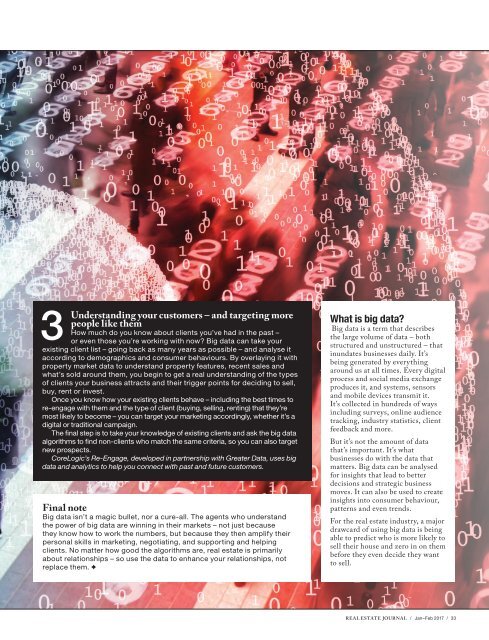REINSW Journal Jan-Feb 2017
The bi-monthly magazine from the Real Estate Institute of NSW
The bi-monthly magazine from the Real Estate Institute of NSW
Create successful ePaper yourself
Turn your PDF publications into a flip-book with our unique Google optimized e-Paper software.
3<br />
Understanding your customers – and targeting more<br />
people like them<br />
How much do you know about clients you’ve had in the past –<br />
or even those you’re working with now? Big data can take your<br />
existing client list – going back as many years as possible – and analyse it<br />
according to demographics and consumer behaviours. By overlaying it with<br />
property market data to understand property features, recent sales and<br />
what’s sold around them, you begin to get a real understanding of the types<br />
of clients your business attracts and their trigger points for deciding to sell,<br />
buy, rent or invest.<br />
Once you know how your existing clients behave – including the best times to<br />
re-engage with them and the type of client (buying, selling, renting) that they’re<br />
most likely to become – you can target your marketing accordingly, whether it’s a<br />
digital or traditional campaign.<br />
The final step is to take your knowledge of existing clients and ask the big data<br />
algorithms to find non-clients who match the same criteria, so you can also target<br />
new prospects.<br />
CoreLogic’s Re-Engage, developed in partnership with Greater Data, uses big<br />
data and analytics to help you connect with past and future customers.<br />
Final note<br />
Big data isn’t a magic bullet, nor a cure-all. The agents who understand<br />
the power of big data are winning in their markets – not just because<br />
they know how to work the numbers, but because they then amplify their<br />
personal skills in marketing, negotiating, and supporting and helping<br />
clients. No matter how good the algorithms are, real estate is primarily<br />
about relationships – so use the data to enhance your relationships, not<br />
replace them.<br />
What is big data?<br />
Big data is a term that describes<br />
the large volume of data – both<br />
structured and unstructured – that<br />
inundates businesses daily. It’s<br />
being generated by everything<br />
around us at all times. Every digital<br />
process and social media exchange<br />
produces it, and systems, sensors<br />
and mobile devices transmit it.<br />
It’s collected in hundreds of ways<br />
including surveys, online audience<br />
tracking, industry statistics, client<br />
feedback and more.<br />
But it’s not the amount of data<br />
that’s important. It’s what<br />
businesses do with the data that<br />
matters. Big data can be analysed<br />
for insights that lead to better<br />
decisions and strategic business<br />
moves. It can also be used to create<br />
insights into consumer behaviour,<br />
patterns and even trends.<br />
For the real estate industry, a major<br />
drawcard of using big data is being<br />
able to predict who is more likely to<br />
sell their house and zero in on them<br />
before they even decide they want<br />
to sell.<br />
REAL ESTATE JOURNAL / <strong>Jan</strong>–<strong>Feb</strong> <strong>2017</strong> / 33


